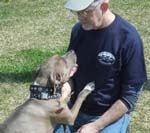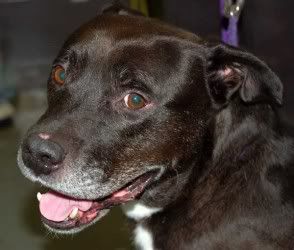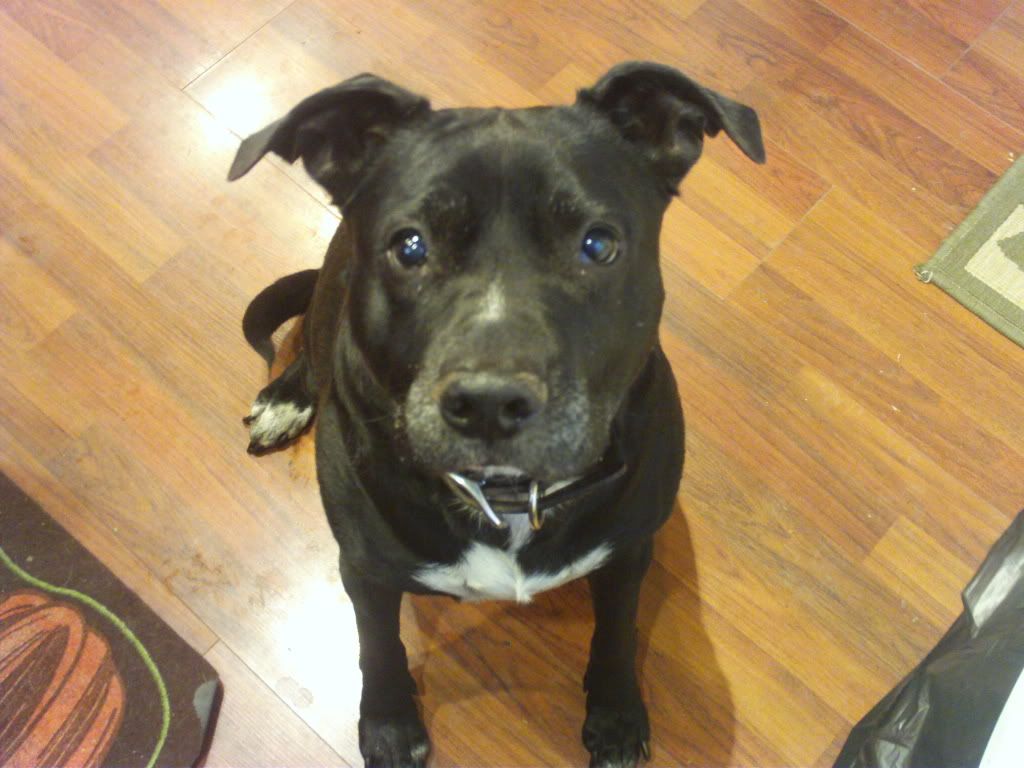Post by michele5611 on Mar 25, 2011 8:44:47 GMT -5
www.thebark.com/content/praise-senior-dogs
In praise of Senior Dogs
When I first saw Rooney at the Martinez, Calif., animal shelter, she was dazed, matted and unsteady— obviously on her last legs. Her breath could’ve fueled my car. As a dog rescuer, I kicked myself for agreeing to see her. What possible prospects could I offer this bedraggled old Border Collie, beyond a marginally better demise?
Within two months (and minus several bad teeth), she was adopted—and seven years later, just after her passing, I look back on her as one of my all-time favorite success stories.
Named for her resemblance to “60 Minutes” commentator Andy, she was a grand old gal, full of nobility, life and love. She was gentle with adults and grandkids, she respected cats, and she kept younger dogs in line, even with that half-empty maw. Rooney was quick to settle into a regular routine, and when you patted her she just oozed gratitude and affection. In short, she was the perfect companion for Margie, the empty nester who adopted her. The world would have been poorer if those two hadn’t matched up and devoted themselves to each other.
If you’re approaching your AARP years (or even if you’re far from it), you’ve probably read about the many health benefits of pet ownership. Study after study has shown that blood pressure goes down, cholesterol levels improve and even heart attack risk declines. Companion animals may be the anti-aging medicine that you really should “ask your doctor about.” Having a pet also encourages you to get out and exercise, even if it’s just a gentle daily walk. And statistics don’t count the warmth, companionship and pure love that a mature canine can bring into a household.
Adult dogs are settled into their personalities, so you know what you’re getting more than you would with a puppy or yearling. They are usually house-trained, and may already know basic commands like “sit” and “stay.” Contrary to the old adage, you can teach these dogs new tricks—with adolescence out of their systems, they tend to focus pretty well on teaching moments. Their desire to please their people is very well ingrained.
And I can’t prove it, but I’ve heard it said too many times to discount the notion that adult adoptees are just plain grateful—they’ve seen the world’s harsher side and seem particularly appreciative of the new lease on life they’ve been given.
In recognition of the many mutual benefits of matching older dogs with their human counterparts, many shelters have established “seniors-forseniors” programs. They offer reduced adoption fees to folks older than some threshold age for mature dogs—typically six or more years old.
I recall an older gentleman who was looking over some impossibly cute foster puppies. Asked where he planned to be in ten years, he replied, smiling, “Dirt nap!” With many breed life expectancies in the 12–18 year range (smaller being typically longer-lived), six- or seven-year-old dogs—and even teenagers like Rooney, still have plenty of good “tread-life” on them. My senior friend decided on an eight-year-old Lab mix, and they’ve never looked back. (And I know Margie wouldn’t trade her years with Rooney for anything. She’s since taken in Gloria, another senior grand dame.)
A shelter in Reno recently received a letter from a woman who had adopted a senior dog there some time ago and then returned for another. She wrote: “Frankie’s time with me was very good. He was loving, gentle and a good friend. He would bound out of the house at the end of the day when I returned home from work. He would wiggle with happiness to see me. He would do those “play bows” that sometimes much younger dogs do.
“I want to tell you that I think I needed Frankie more than he needed me, but he loved me and I was grateful for that wonderful creature every day that I had him. My new girl, Willow, is lying at my feet chewing on a rawhide. I hope this makes sense—I heard her snore last night while I was watching television. I can hear her breathe and I am not so alone.
“It is possible that animals are our greatest gifts in this life.”
Sitting here with that story fresh in my mind, where it shares space with fond memories of Rooney, I am gratified to know that these adoptions can hold such meaning and so enrich the lives of all concerned. If you have a hankering for “one more good dog,” please consider adopting an older best friend—it’s one of the biggest win-win opportunities that senior life affords.
In praise of Senior Dogs
When I first saw Rooney at the Martinez, Calif., animal shelter, she was dazed, matted and unsteady— obviously on her last legs. Her breath could’ve fueled my car. As a dog rescuer, I kicked myself for agreeing to see her. What possible prospects could I offer this bedraggled old Border Collie, beyond a marginally better demise?
Within two months (and minus several bad teeth), she was adopted—and seven years later, just after her passing, I look back on her as one of my all-time favorite success stories.
Named for her resemblance to “60 Minutes” commentator Andy, she was a grand old gal, full of nobility, life and love. She was gentle with adults and grandkids, she respected cats, and she kept younger dogs in line, even with that half-empty maw. Rooney was quick to settle into a regular routine, and when you patted her she just oozed gratitude and affection. In short, she was the perfect companion for Margie, the empty nester who adopted her. The world would have been poorer if those two hadn’t matched up and devoted themselves to each other.
If you’re approaching your AARP years (or even if you’re far from it), you’ve probably read about the many health benefits of pet ownership. Study after study has shown that blood pressure goes down, cholesterol levels improve and even heart attack risk declines. Companion animals may be the anti-aging medicine that you really should “ask your doctor about.” Having a pet also encourages you to get out and exercise, even if it’s just a gentle daily walk. And statistics don’t count the warmth, companionship and pure love that a mature canine can bring into a household.
Adult dogs are settled into their personalities, so you know what you’re getting more than you would with a puppy or yearling. They are usually house-trained, and may already know basic commands like “sit” and “stay.” Contrary to the old adage, you can teach these dogs new tricks—with adolescence out of their systems, they tend to focus pretty well on teaching moments. Their desire to please their people is very well ingrained.
And I can’t prove it, but I’ve heard it said too many times to discount the notion that adult adoptees are just plain grateful—they’ve seen the world’s harsher side and seem particularly appreciative of the new lease on life they’ve been given.
In recognition of the many mutual benefits of matching older dogs with their human counterparts, many shelters have established “seniors-forseniors” programs. They offer reduced adoption fees to folks older than some threshold age for mature dogs—typically six or more years old.
I recall an older gentleman who was looking over some impossibly cute foster puppies. Asked where he planned to be in ten years, he replied, smiling, “Dirt nap!” With many breed life expectancies in the 12–18 year range (smaller being typically longer-lived), six- or seven-year-old dogs—and even teenagers like Rooney, still have plenty of good “tread-life” on them. My senior friend decided on an eight-year-old Lab mix, and they’ve never looked back. (And I know Margie wouldn’t trade her years with Rooney for anything. She’s since taken in Gloria, another senior grand dame.)
A shelter in Reno recently received a letter from a woman who had adopted a senior dog there some time ago and then returned for another. She wrote: “Frankie’s time with me was very good. He was loving, gentle and a good friend. He would bound out of the house at the end of the day when I returned home from work. He would wiggle with happiness to see me. He would do those “play bows” that sometimes much younger dogs do.
“I want to tell you that I think I needed Frankie more than he needed me, but he loved me and I was grateful for that wonderful creature every day that I had him. My new girl, Willow, is lying at my feet chewing on a rawhide. I hope this makes sense—I heard her snore last night while I was watching television. I can hear her breathe and I am not so alone.
“It is possible that animals are our greatest gifts in this life.”
Sitting here with that story fresh in my mind, where it shares space with fond memories of Rooney, I am gratified to know that these adoptions can hold such meaning and so enrich the lives of all concerned. If you have a hankering for “one more good dog,” please consider adopting an older best friend—it’s one of the biggest win-win opportunities that senior life affords.







 Terrible!
Terrible!

 I look forward to learning much here
I look forward to learning much here